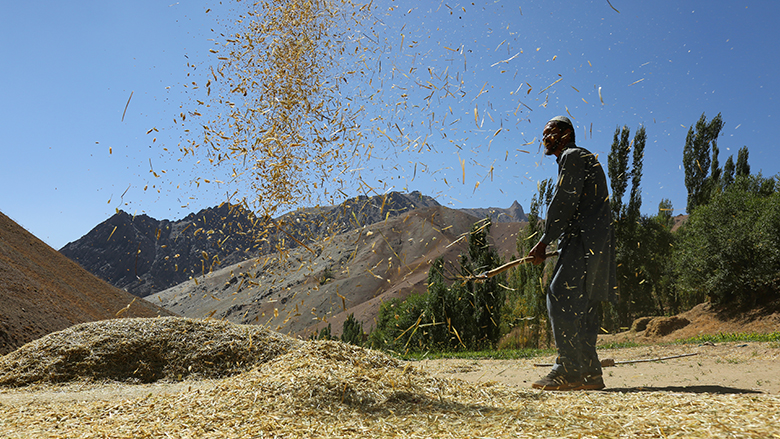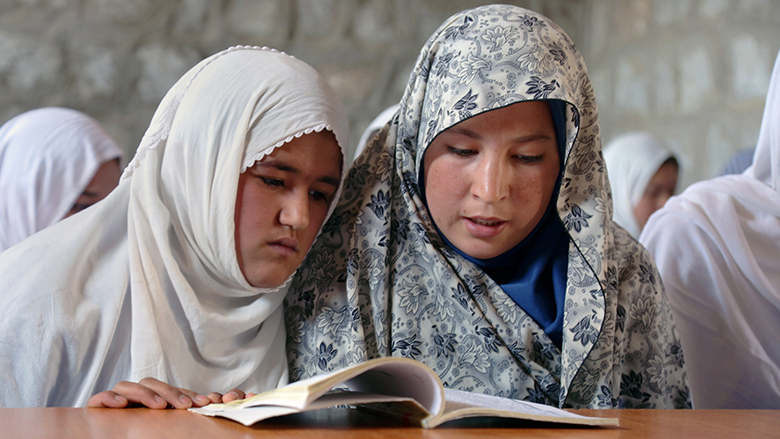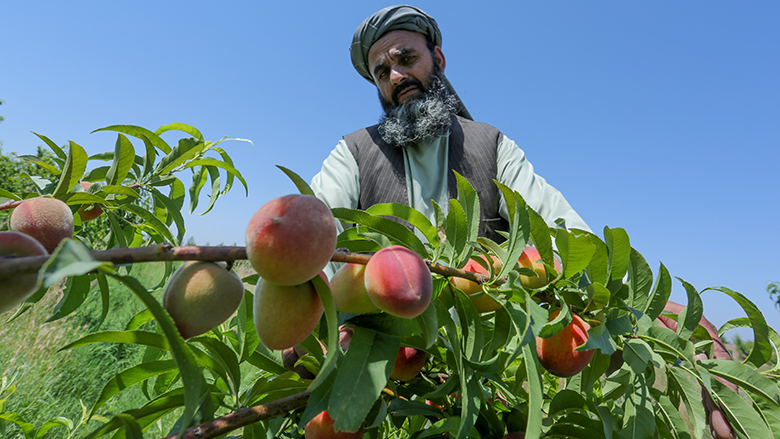Latest News
New Strategy to Support Growth, Stability in Afghanistan

Agriculture accounts for 56 percent of employment in Afghanistan and sector growth plays a key role in poverty reduction.
- The World Bank Group’s assistance to Afghanistan for 2017-2020 will support the government’s strategic vision and goal to reduce poverty.
- It will be based on a strategic framework that will be flexible and responsive to the country’s growing uncertainty and limited fiscal resources.
- The strategy will prioritize and promote interventions that have the greatest impact in addressing drivers of conflict, help mitigate the consequences of the ongoing conflict, and build for longer-term stability, especially with greater development of the private sector and sustained growth and poverty reduction.
The World Bank Group’s strategy to support Afghanistan is set out in the Country Partnership Framework (CPF). It supports the Government of Afghanistan’s strategic vision and goal to reduce poverty, outlined in the Afghanistan National Peace and Development Framework.
The CPF comes at a critical juncture as the current government seeks to build on important achievements in the first two years of its term, but is faced with a range of challenges from growing insecurity to stagnating growth and rising levels of poverty.
The CPF covers a four-year period, from 2017 to 2020, and sets out a medium-term strategic framework that is intended to be flexible and responsive to the rapidly evolving situation in Afghanistan.
The World Bank Group strategy aims to help Afghanistan:
- Build strong and accountable institutions to support the government’s state-building objectives and enable the state to fulfil its core mandate to deliver basic services to its citizens, and create an enabling environment for the private sector;
- Support inclusive growth, with a focus on lagging areas and urban informal settlements; and
- Deepen social inclusion through improved human development outcomes and reduced vulnerability amongst the poorest sections of society, including the large numbers of internally displaced persons and returnees.
Focus on expanding access to education will continue under the new Country Strategy Framework, together with programs to increase the numbers of women education and health workers.
Shubham Chaudhuri
The National Horticulture and Livestock Project (NHLP) has established 1,824 jeribs (approximately 900 acres) of new farmland to grow almonds, pistachios apricots, apples, plums, cherries and peaches.
The CPF addresses cross-cutting issues in its design and implementation. It seeks to improve governance through building a more responsive, capable, and accountable state. Tackling corruption is an important area of governance and is addressed in each of the three pillars of the framework.
In recognition of climate-related shocks that affect in particular Afghanistan’s poorest citizens, the CPF includes, for the first time, explicit measures to increase resilience to climate variability and change, such as planned energy engagements with a focus on sustainable renewables to tackle climate change, and to develop capacity for early warning and response to natural disasters.
The CPF also addresses directly the need for greater social and economic inclusion to ensure an equal and just society. The framework will support development of a platform on gender and social inclusion to help the government promote gender equality.
The International Development Association (IDA), the World Bank Group’s fund for the poorest countries and the Afghanistan Reconstruction Trust Fund (ARTF) resources underpin the Bank Group’s long-term engagement and commitment to Afghanistan. Annual IDA and ARTF commitments to Afghanistan have been around $200 million and $900 million, respectively. IDA allocations are expected to be increased in Afghanistan and other fragile and conflict-affected countries. The additional funds available will provide the necessary flexibility for the Bank to respond to new priorities fully aligned with the strategy, such as additional support in education and health service delivery, expansion of social safety nets, and urban development.
The International Finance Corporation (IFC), the World Bank Group’s private sector arm, aims to expand its commitments in Afghanistan from its current portfolio of $54 million to a cumulative investment of about $80 million over the CPF period. The Multilateral Investment Guarantee Agency (MIGA), the Bank Group’s political risk insurance arm, stands ready to provide additional support with a focus in the finance, manufacturing, agribusiness and services, and infrastructure sectors.
Mitigate impact of risks
The preparation of the CPF was guided by the learning experiences of the Interim Strategic Notes that formed the basis of past Bank Group support, as well as reviews from ARTF and independent evaluation groups. In addition, the CPF was guided by the Systemic Country Diagnostics (SCD) that was finalized in February 2016. The SCD was conducted before the CPF to inform strategic discussions about priority areas for the World Bank Group’s future support to Afghanistan. During CPF development, consultations were held with a broad spectrum of stakeholders, including international donors, nongovernmental organizations and civil society, and the private sector.
The two principal risks to the CPF program are the intensifying conflict and political instability. The CPF fully acknowledges these risks and the strategy and program it lays out is intended to mitigate their impact.
By: The World Bank

Latest News
Tripartite trade meeting held in Kabul to boost regional connectivity

A tripartite meeting between the delegations of Afghanistan, Turkmenistan and Kazakhstan was held in Kabul with the aim of connecting North Asia to South Asia and reducing transit and transportation costs among these three countries, the Ministry of Trade and Commerce said in a statement.
In this meeting, an agreement was reached on the creation of a joint technical committee to continue the talks.
This tripartite meeting was held under the leadership of Nooruddin Azizi, the Acting Minister of Industry and Commerce, Vice President of Turkmenistan and Srik Zhumangarin, the Deputy Prime Minister of Kazakhstan.
Earlier, a bilateral meeting was held between the delegation of the Islamic Emirate and Turkmenistan. The ministry of commerce said the participants of the meeting discussed the construction of a large joint logistics center in Torghondi, the trilateral transit agreement between the IEA, Turkmenistan, and Kazakhstan, the expansion of Afghanistan’s railway, solving issues related to Afghan transit and export goods, and a number of other commercial issues.
Latest News
No destructive groups including Daesh present in Afghanistan: Yaqub Mujahid
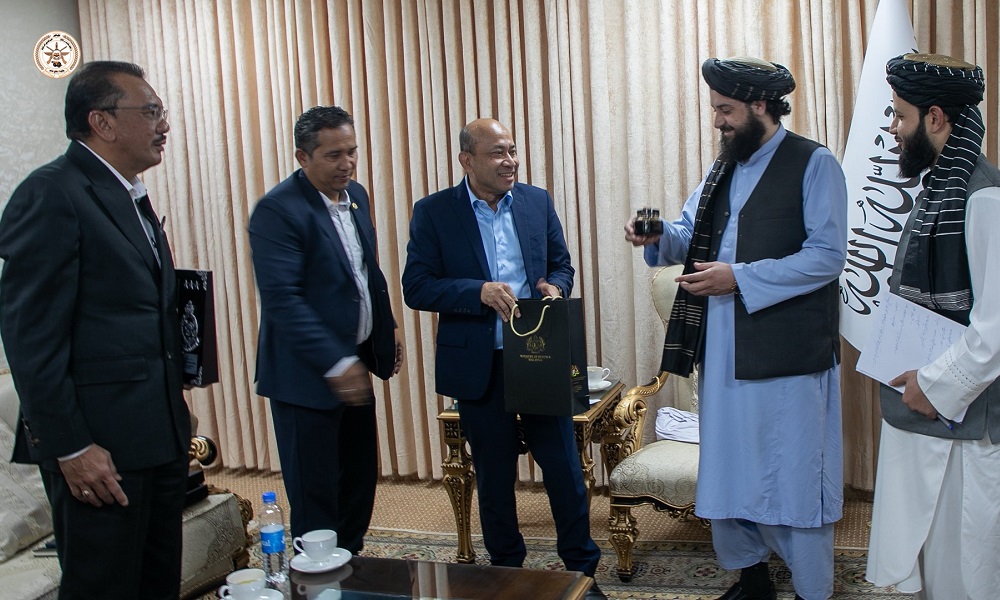
Acting Minister of National Defense Mohammad Yaqub Mujahid has said that no destructive groups including Daesh have physical presence in Afghanistan, adding the Islamic Emirate of Afghanistan (IEA) will not allow anyone to pose threat to any country in the region from the Afghan soil.
Mujahid made the remarks in a meeting with a delegation from Malaysia in Kabul on Thursday.
According to a statement released by the Ministry of Defense, Mujahid highlighted Malaysia’s “good treatment” of Afghan refugees and its long-standing relations with Afghanistan, and said that Malaysia is a powerful Islamic country and visits should increase.
He added that with the establishment of the Islamic Emirate, occupation and war ended in Afghanistan, and the country is fully secure.
Based on the statement, the Malaysian delegation called Afghanistan a friendly country and while emphasizing on comprehensive cooperation, it assured that what they have seen in Afghanistan will be shared with the authorities of their country.
Latest News
EU allocates 17 million euros to support Afghans on the move
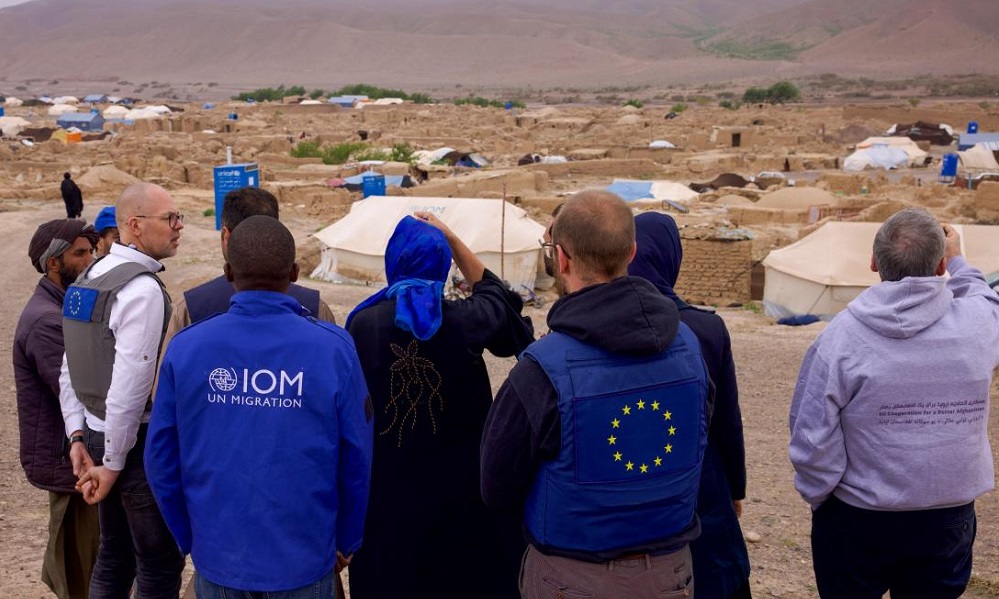
The European Union signed an agreement worth 17 million euros with the International Organization for Migration (IOM) to improve access to basic services, increased economic opportunities and protection for Afghans on the move and their host communities in Afghanistan.
The needs of women and girls are a particular focus of the programme, EU said in a statement released on Thursday.
The statement noted that from January 2023 until April 2024, over 1.5 million Afghans returned from Pakistan and Iran.
“I am deeply moved by the hardship returnees face when being deported to Afghanistan. In a country suffering from poverty and climate change, and in a city that just saw devastating earthquakes, this truly is a crisis within a crisis.”, said Peteris Ustubs, Director for the Middle East, Asia and Pacific of the European Commission’s Department for International Partnerships during the signing ceremony at the IOM transit centre in Herat.
Raffaella Iodice, EU Chargée d’Affaires a.i. to Afghanistan, added “The solidarity of the Afghan people towards their brothers and sisters is an inspiration. We must assure that communities hosting and helping new arrivals are supported. The partnership with IOM ensures access to essential services and provides protection for Afghan returnees and their host communities. As women and girls can be particularly affected, we make sure that all members of society can benefit”.
“IOM’s continued partnership with the EU has been critical in enabling our teams to reach hundreds of thousands of Afghan returnees and other vulnerable communities in the country”, said IOM Afghanistan Chief of Mission, Maria Moita. “Thanks to this renewed commitment, we will be able to focus on addressing the immense challenges in the areas of return and contribute to reintegration, social cohesion, and longer-term solutions for those communities.”
This additional contribution is part of a 5-year programme that is being implemented across Afghanistan and in four countries in the region. It builds on the EU’s previous support to IOM to improve the wellbeing of Afghans forced to return to the country, EU said.
-

 Latest News3 days ago
Latest News3 days agoRashid Khan named AWCC’s brand ambassador
-

 Regional4 days ago
Regional4 days agoIranian president lands in Pakistan for three-day visit to mend ties
-

 Sport4 days ago
Sport4 days agoKolkata beat Bengaluru by one run in IPL as Kohli fumes at dismissal
-

 Sport4 days ago
Sport4 days agoACL: Aino Mina 3-0 Istiqlal Kabul; Attack Energy 3-0 Khadim
-

 Climate Change4 days ago
Climate Change4 days agoRescuers race to reach those trapped by floods in China’s Guangdong
-

 Business5 days ago
Business5 days agoAfghanistan, Kazakhstan to hold joint expo in Kabul
-

 World3 days ago
World3 days agoMalaysian navy helicopters collide in mid-air, 10 killed
-

 Sport3 days ago
Sport3 days agoJaiswal ton powers Rajasthan to big IPL win

